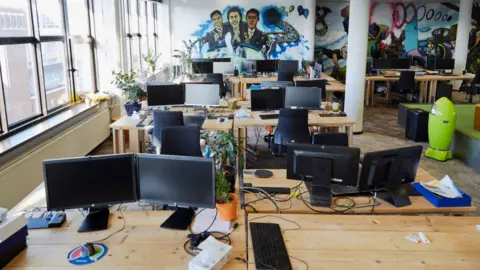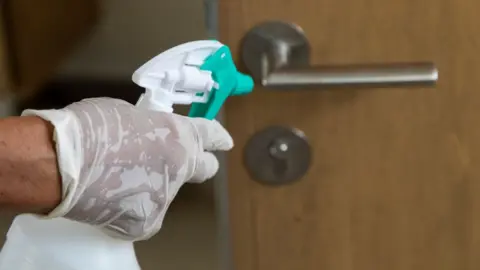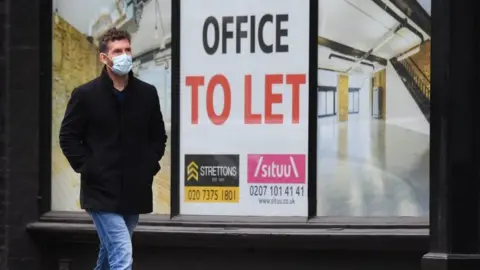The uncertain future of Britain's offices
 Getty Images
Getty ImagesAs David Brent made clear in the hit TV comedy The Office, there is a rich and rewarding career to be had in servicing the needs of other offices.
Or at least there was before the pandemic hit, and everyone started working from home.
From paper suppliers in Slough, to cleaning, maintenance and catering firms, whole industries are focused on providing office-based companies with what they need to keep working.
But what is the future of such office supply firms when large numbers of people are expected to continue to work remotely at least half the time when the pandemic is finally over?
This is tipped to result in many companies shutting large offices and switching to smaller ones. And for some to get rid of their office altogether.
The cleaning industry in the UK is sometimes almost invisible, yet it employs one million people across 65,000 firms. Worth £54bn to the UK economy, according to industry body the British Cleaning Council, about a third of that figure applies to offices. With the remainder being healthcare, hotels, restaurants, pubs and factories.
Yvonne Taylor is global head of cleaning at the OCS Group, the international facilities management giant with a turnover of £1bn a year.
She says that while there may be fewer offices to clean in the future, the upside to the pandemic for the cleaning industry is that now they are "seen a lot more as experts".
 OCS Group
OCS GroupAnd while she is concerned that some companies may cut their cleaning budgets due to financial pressures, she says that the response to coronavirus has brought more professionalism to the cleaning industry.
As she explains, often office carpets don't need vacuuming every day, but "touchpoints" like light switches and door handles most certainly now do need regular cleaning.
The solution she says is to set strict cleaning specifications, and then "use technology and data to provide evidence that confirms we are delivering".
Yvonne also expects to see much more use of robots and new machinery, and more training for cleaning staff, including the introduction of an apprenticeship scheme for the industry.
She believes that the need for this additional training and technology is explained by the new requirement for rotational cleaning. "We now rotate our disinfectants to safeguard against microbial resistance, we don't know if Covid will build up a resistance to certain disinfectants."
So while the cleaning industry may have smaller, and perhaps fewer, offices to clean, it is going to have to work harder to keep them safe.
 Getty Images
Getty ImagesChristian Slingsby is the fourth generation of his family to hep run Yorkshire-based workplace supplies business Slingsby.
Despite offices across the UK being thin on staff over the past year, Mr Slingsby, an account director at the firm, says that overall sales remained steady, due to a big rise in demand for Covid protection equipment.
"We've done a lot more table screens and other barriers," he says. "And pedal bins [so you don't need to use your hands], hand sanitizers and thermometers."
He says this is all part of a change in culture: "Health and safety has been reviewed by everybody from the top down," he says. "People are thinking 'we can't afford to have any slips up here, we have to have the right kit in place'."
 Getty Images
Getty ImagesHowever, for some companies Covid has been like hitting a brick wall. Online platform Feedr delivers food to offices through its core business Cloud Catering, allowing offices without a canteen to order in restaurant food for their staff.
"It went from going at 100mph to absolutely zero," says Linda Blank, Feedr's head of international development and strategic projects, looking back at the start of the pandemic.
"No one was in the office, and if you're not in the office you're not ordering any lunch, so it was a complete collapse of revenue."
Feedr reacted by delivering to employees' homes instead - a "logistical nightmare" says Ms Blank which meant having to "rethink all our operations completely".
Business has started to pick up now, but at the start of this year Ms Blank says most clients were still saying "I don't want to even talk to anyone".


New Economy is a new series exploring how businesses, trade, economies and working life are changing fast.

Feedr is now hoping to attract new business from firms who have cut their office headcount. Ms Blank says that with many businesses planning to have fewer staff in the office at any time time the economies favour her company.
"There will be bigger companies, say with a headcount of 500 people that would have been too big for our solution," she says. "But if now they go back and have only 250 or 300 people in the office at any one time that means the onsite canteen becomes less profitable and becomes a bigger cost. And they will look at alternative solutions like ordered in food."
Continuing home working also means it will be a brave company that starts building new office blocks any time soon.
As a result, Michael Pain, head of the tenant advisory team at property consultancy Carter Jonas says the industry will be seeking permission to change offices into homes. "Changing use depends on the local council, but in theory there is no reason why you can't get change of use permission."
 John Farnell
John Farnell"It was happening in central London long before pandemic. In the aftermath of 2008 credit crunch, councils looked favourably on applications to change to residential use."
A lot of office space in London's West End has already been changed to flats, and there is no reason that trend can't spread around the country.
Many people think of offices as just rooms with desks, chairs and computer screens, but they are also vast consumers of other businesses products, from printers and paper, to food and drink. They have to be built, maintained and cleaned, and the people in them fed and watered. And with the services sector representing 80% of the British economy, there are an awful lot of offices.
This huge sector is undergoing radical and drastic changes that normally take decades. The host of other industries that supply it, are going to have to adapt to that new reality if they want to survive.
